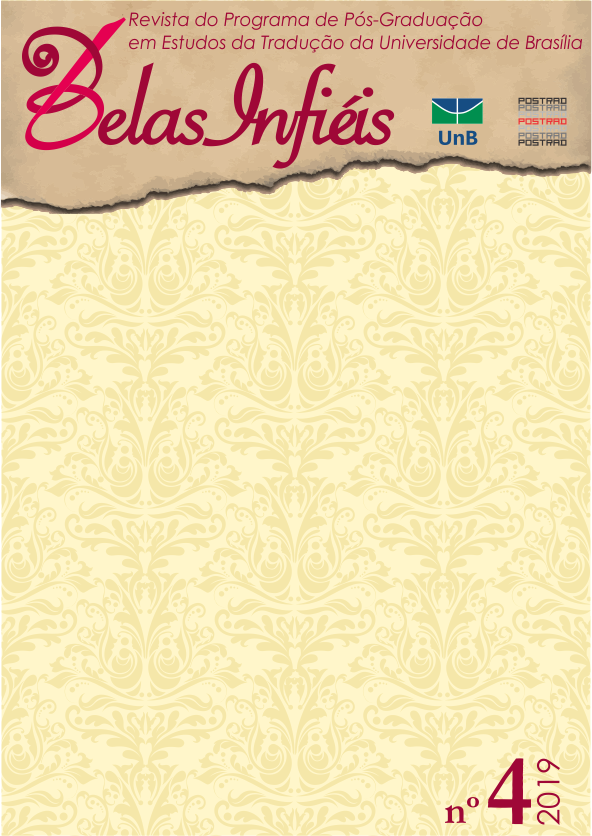A produção literária contemporânea na Espanha: Caleidoscópio de sensações, de Elvira Cámara Aguilera ”“ tradução anotada e comentada
DOI :
https://doi.org/10.26512/belasinfieis.v8.n4.2019.25001Mots-clés :
Tradução literária. Literatura Espanhola. Língua Espanhola. Teoria da Tradução. Literatura Comparada.Résumé
Este texto tem o objetivo de oferecer ao público brasileiro, ainda que inicialmente, uma nova alternativa de leitura, ao apresentar-lhe uma nova autora. Enfatizando a produção literária espanhola contemporânea, nos debruçamos sobre a recente obra da professora universitária e escritora Elvira Cámara Aguilera (Higuera de Calatrava, Jaén, 1968). Para tanto, traduzimos para o português do Brasil um de seus relatos, publicados na coletânea Memorias de una noche y otros relatos (2015). Com essa iniciativa, nosso objetivo não é apenas dar a conhecer a autora e sua obra, mas também provocar o leitor brasileiro, no melhor sentido da palavra, para que busque conhecer novos autores e, a partir da literatura, seja capaz de estabelecer pontes e diálogos relevantes para o enriquecimento dos dois sistemas literários em questão. Além disso, interessa-nos difundir uma obra que, devido à distância geográfica e aos obstáculos linguísticos, ainda não é conhecida no Brasil. A pesquisa que o processo tradutório levou a cabo fundamentou-se nas premissas de autores como Berman (2004), Carvalhal (2003), Mittmann (2003), Nord (1994) e Vidal Claramonte (2008). Todos estes autores reconhecem, em maior ou menor grau, o papel ativo e decisivo dos tradutores literários e avaliam o processo tradutório como constitutivo no reconhecimento das dessemelhanças entre povos e culturas. De acordo com eles, destacamos o uso de diferentes metodologias para atingir a mesma finalidade: em um determinado caso, ante a impossibilidade de encontrar um equivalente perfeito, optamos por uma solução que implicou perda semântica. Em outro caso, optamos por esclarecer as diferenças por meio de notas de fim, explicitando-as. Durante todo o processo, reivindicamos o espaço da literatura, seja ela vernácula ou estrangeira, como promotora de fruição e imaginação.
Téléchargements
Références
BERMAN, Antoine. A prova do estrangeiro: cultura e tradução na Alemanha romântica. Bauru: EDUSC, 2002.
CÁMARA AGUILERA, Elvira. Memorias de una noche y otros relatos. Madrid: Lastura, 2015.
CARVALHAL, Tania Franco. O próprio e o alheio. São Leopoldo, Ed. Unisinos, 2003.
MITTMANN, Solange. Notas do tradutor e processo tradutório. Porto Alegre: Ed. UFRGS, 2003.
NORD, Christiane. Traduciendo funciones. In: HURTADO ALBIR, Amparo. (ed.). Estudios sobre la traducción. Castelló: Publicacions de la Universitat Jaume I, 1994. p. 97-112.
VIDAL CLARAMONTE, María del Carmen África. Traducir en el siglo XXI: nuevos retos. In: GÓMEZ MONTERO, Javier. (ed.). Nuevas pautas de traducción literaria. Madrid: Visor Libros, 2008. p. 75-86.
Téléchargements
Publié-e
Comment citer
Numéro
Rubrique
Licence
Copyright Statement
Given the public access to this journal, the texts are free to use but requires the recognition of the original authorship and initial publication in this journal to be properly stated.
The journal allows the use of works published for non-commercial purposes, including the right to submit the work to publicly accessible databases. Published contributions are the sole and exclusive responsibility of the author(s).
- When submitting papers to be evaluated by the Belas Infiéis journal, the author(s):
- Declare that the contents of the contributions are original and of their original creation, being entirely responsible for their content if there is an objection by third parties.
- Claim to be aware that they should not commit academic plagiarism.
- Declare that the manuscript has not been published, completely or partially, in Portuguese or another language. If it is a translation it should be submitted to the Translated Articles section.
- Declare that the manuscript is not being evaluated by other journals.
- Declare that the manuscript was not submitted to another journal simultaneously.
- Commit(s) to inform the journal of any kind of error or inaccuracy in their contribution (published, in evaluation or in editing) and to collaborate with the editors to make due corrections of the article (when in evaluation or editing) or erratum/retraction (after publication).
- Declare that there is no conflict of interest regarding the published work.
- Authorize its release if it is accepted for publication without any kind of monetary compensation.
- Agree to assign non-exclusive rights to publication to the magazine, remaining free to make their contribution available in other media as long as the publication of the first version in Belas Infiéis magazine is mentioned. They also authorize Belas Infiéis to assign their texts for reproduction in content indexers, virtual libraries and similar platforms.
- Maintain copyright and grant the journal the right of first publication, the work being licensed under theCreative Commons Attribution License.
- Is/Are allowed and encouraged to publish and distribute their work online after the editorial process, which may increase the impact and citation of the published work.
- Authorize the editorial team to make textual adjustments and to adapt the article to the publication rules, when necessary.



















